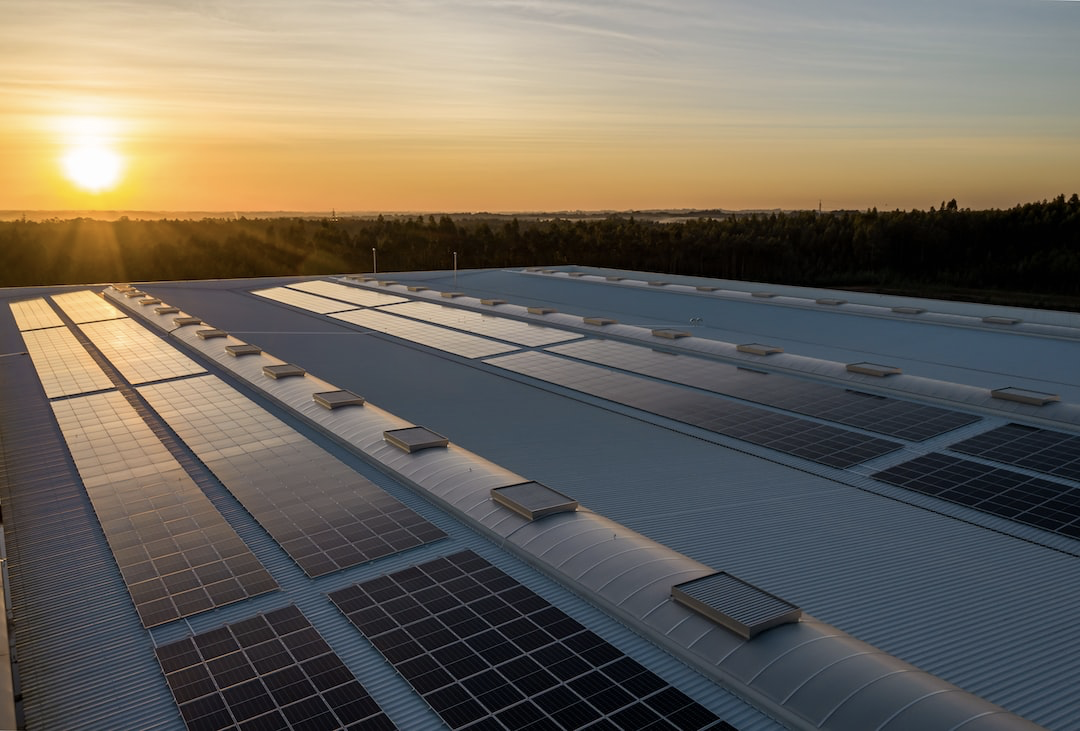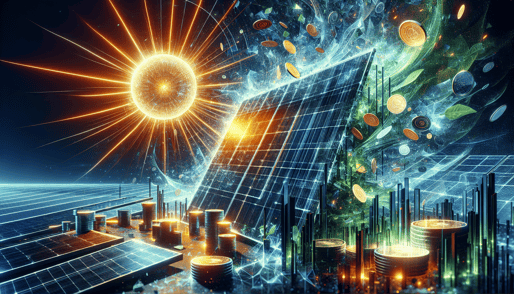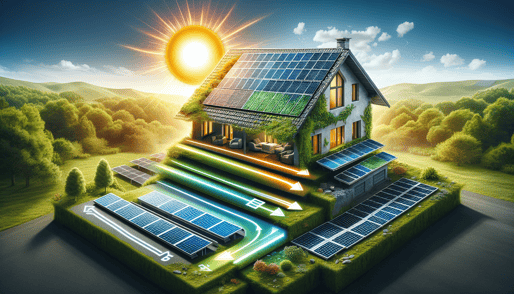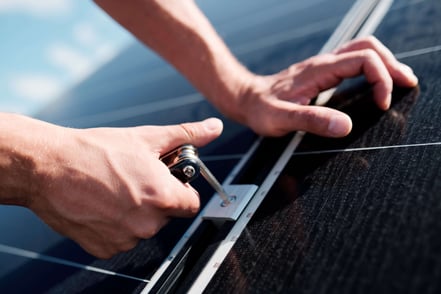In this era of environmental awareness, the shift towards renewable energy sources has become more crucial than ever. Solar power, standing at the forefront of this green revolution, offers a beacon of hope and sustainability. In this blog, we will explore the remarkable advancements in solar panel technology, particularly focusing on high-efficiency glass-glass solar panels. We'll uncover how these innovations are not just elevating the performance and durability of solar systems but are also pivotal in making solar energy more accessible and cost-effective.

Importance of reducing Levelized Cost of Energy (LCOE) in solar energy systems
Reducing the Levelized Cost of Energy (LCOE) in solar energy systems is crucial for making solar power more affordable and competitive in the global energy market. A lower LCOE translates to lower energy costs for consumers and increased adoption of clean, renewable energy sources.
Role of efficient solar panels in lowering LCOE
Efficient solar panels play a significant role in decreasing LCOE by generating more energy per unit area, reducing installation and maintenance costs, and increasing the overall system performance. As a result, investing in high-efficiency solar panels is essential for achieving cost-effective and sustainable solar energy solutions.
Understanding Levelized Cost of Energy (LCOE)
In order to fully grasp the importance of efficient solar panels in reducing the Levelized Cost of Energy (LCOE), it is essential to understand what LCOE is and why it is significant. LCOE refers to the average cost per unit of energy produced by a solar energy system over its lifetime, taking into account initial investment costs, maintenance costs, and the system's performance. The lower the LCOE, the more cost-effective the solar energy system is considered to be.
Several factors can affect the LCOE of a solar energy system, including the efficiency of the solar panels, the durability and longevity of the system, and the effectiveness of energy storage solutions. By addressing these factors, it becomes possible to optimise the solar energy system for the lowest LCOE, making it a more attractive option for energy consumers and investors alike.
Belinus High-Efficiency Solar Panels
Belinus offers a range of high-efficiency glass-glass solar panels that contribute significantly to reducing the Levelized Cost of Energy (LCOE). These advanced solar panels provide a higher yield, up to 25% more compared to traditional panels, and have a much lower risk of developing microcracks. Consequently, this increased efficiency translates into a more cost-effective solar energy system.
Overview of Belinus' glass-glass solar panels
Our glass-glass solar panels are a step ahead of traditional panels, offering improved performance and durability. Unlike traditional panels that consist of glass and a plastic backsheet, Belinus' solar panels feature a double layer of glass, ensuring better protection against external factors and prolonging their lifespan. This design contributes to a more efficient energy production and a lower LCOE in the long run.
Higher efficiency and its impact on LCOE
Efficiency plays a crucial role in determining the LCOE of a solar energy system. Our high-efficiency solar panels, with their advanced technologies such as Interdigitated Back Contact (IBC) and Heterojunction Technology (HJT), offer better performance and higher efficiency rates. This translates into more energy production and lower costs over the lifetime of the solar panels, ultimately resulting in a reduced LCOE for the end-user.
By investing in our high-efficiency solar panels, homeowners and businesses can significantly lower their LCOE, making solar energy a more affordable and sustainable solution for their energy needs.
Longevity and durability of solar panels
The lifespan and durability of solar panels play a crucial role in determining their Levelized Cost of Energy (LCOE). Investing in high-quality solar panels with a long lifespan can significantly reduce the LCOE and ensure better returns on investment. In this section, we will discuss the impact of product lifespan on LCOE and Belinus' 35-year warranty on their solar panels.
Impact of product lifespan on LCOE
Longer-lasting solar panels can generate more energy over their lifetime, which ultimately lowers their LCOE. The longer a solar panel can produce energy efficiently, the more cost-effective it becomes over time. In addition, durable solar panels require less maintenance and are less likely to need replacements, further reducing the overall costs associated with solar energy systems.
Belinus' 35-year warranty on product, power and service
We offer a comprehensive 35-year warranty on the product, power output and service for all our glass-glass solar panels. This warranty ensures that customers can rely on the quality and performance of their solar panels for an extended period, contributing to a lower LCOE. By providing a long-term warranty, Belinus demonstrates its commitment to delivering durable and efficient solar panels that can withstand extreme weather conditions and continue to generate energy for decades.
In conclusion, the longevity and durability of solar panels are critical factors in reducing the LCOE of a solar energy system. By choosing high-quality solar panels with a long lifespan and comprehensive warranty, such as those offered by us, customers can enjoy a more cost-effective and sustainable energy solution.
Advanced technologies for lower LCOE
Innovative technologies play a crucial role in reducing the Levelized Cost of Energy (LCOE) for solar energy systems. By incorporating advanced technologies into solar panel manufacturing, companies like Belinus can offer highly efficient and cost-effective solar energy solutions. In this section, we will discuss Interdigitated Back Contact (IBC) and Heterojunction Technology (HJT), ultra black solar cell technology, and the benefits these technologies bring in reducing LCOE.
Interdigitated Back Contact (IBC) and Heterojunction Technology (HJT)
IBC and HJT are advanced solar cell technologies that contribute to higher efficiency rates and better performance. IBC technology involves placing all electrical contacts on the back of the solar cell, resulting in reduced shading on the front surface and improved light absorption. On the other hand, HJT combines the advantages of crystalline silicon and thin-film solar cells, offering high efficiency and excellent temperature stability. The integration of IBC and HJT in Belinus' solar panels results in a more cost-effective energy solution over time.
Ultra black solar cell technology
Another advanced technology used by Belinus is the ultra black solar cell technology. This technology ensures that the solar cells absorb 99.7% of available sunlight, maximising energy production and contributing to a lower LCOE. Ultra black technology achieves this high absorption rate by incorporating a unique surface texture and anti-reflective coating, allowing for enhanced performance even in low light conditions.
Benefits of these technologies in reducing LCOE
By incorporating IBC, HJT, and ultra black solar cell technologies into their solar panels, we can offer a range of benefits that contribute to reducing LCOE. These benefits include higher efficiency rates, better performance under various environmental conditions, and improved light absorption. As a result, customers who choose Belinus' solar panels can expect a more cost-effective and sustainable energy solution that helps minimise LCOE over the long term.
Quality assurance and sustainability
In the pursuit of reducing the Levelized Cost of Energy (LCOE) with efficient solar panels, it is crucial to consider quality assurance and sustainability. Solar panels that are produced in high-quality facilities and undergo rigorous inspection processes contribute to a more cost-effective and reliable energy solution.
Production in Bloomberg Tier-1 listed factories
Belinus solar panels are manufactured in Bloomberg Tier-1 listed factories, which are known for their high sustainability and quality standards. These facilities adhere to strict guidelines and industry best practices, ensuring that the solar panels produced are of the highest quality. By using solar panels from such reputable manufacturers, customers can trust that their investment in solar energy will be more reliable and long-lasting, ultimately leading to a lower LCOE.
Engineering and quality inspection services
Belinus goes beyond just offering high-quality solar panels by also providing engineering and quality inspection services. This ensures that customers receive solar panels that are not only efficient but also reliable and durable. By having a thorough quality control process in place, potential issues can be identified and rectified before the solar panels reach the end-user. This level of commitment to quality assurance further contributes to the reduction of LCOE, as customers can trust that their solar energy system will perform optimally and require minimal maintenance over its lifetime.
In conclusion, the combination of manufacturing in Bloomberg Tier-1 listed factories and providing engineering and quality inspection services ensures that our solar panels are of the highest quality and sustainability. This ultimately contributes to a lower LCOE, as customers can trust that their investment in solar energy will yield long-term energy savings and a reliable energy solution.
Subsidies and grants for solar energy systems
Investing in solar energy systems can often be a significant financial decision for homeowners and businesses. However, numerous subsidies and grants are available to help offset the initial costs, ultimately reducing the Levelized Cost of Energy (LCOE) for solar power systems. This section will explore the available financial support in Flanders and how it can impact LCOE.
Available subsidies and grants in Flanders
In Flanders, various financial incentives are available to support the adoption of solar energy systems. These subsidies and grants are designed to make solar power more accessible and affordable for residents and businesses. By leveraging these incentives, solar energy system owners can significantly reduce their initial investment costs and achieve a more cost-effective energy solution.
How financial support can reduce LCOE
Financial support in the form of subsidies and grants can play a crucial role in reducing the LCOE of solar energy systems. By lowering the initial investment costs, these incentives can help solar power system owners achieve a faster return on investment. As a result, the LCOE of the solar energy system decreases, making solar power a more attractive and financially viable option for generating clean, renewable energy. It is essential to research and take advantage of available financial support in your region to maximise the cost-effectiveness of your solar energy system.
Belinus' commitment to global expansion
We aim to expand our presence globally, increasing accessibility to our advanced solar technologies for customers around the world. Our company strives to achieve the lowest possible LCOE for our customers, making solar energy a more attractive and sustainable option for homeowners and businesses alike.
Unlock Solar Savings
Efficient solar panels play a crucial role in reducing Levelized Cost of Energy, ensuring long-term savings. Belinus offers high-efficiency glass-glass solar panels with advanced technologies, such as IBC and HJT, and ultra black solar cell technology. These technologies contribute to a lower LCOE and maximise energy production. Explore our high-efficiency solar panels and advanced technologies for a lower LCOE.




